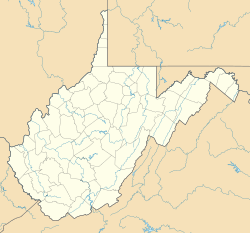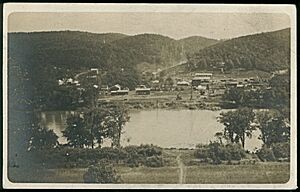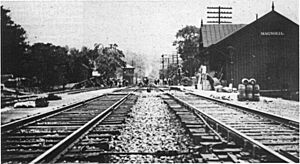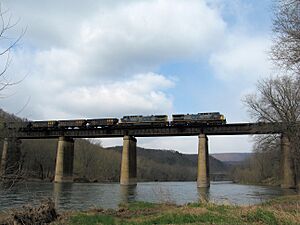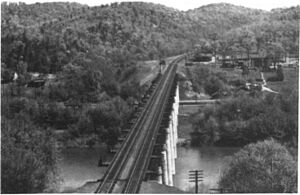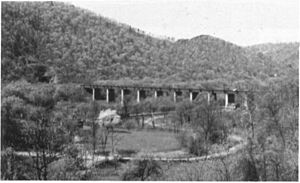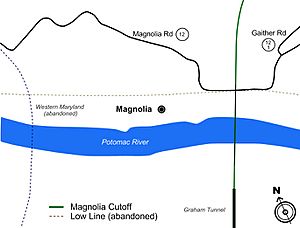Magnolia, West Virginia facts for kids
Quick facts for kids
Magnolia
|
|
|---|---|
| Country | United States |
| State | West Virginia |
| County | Morgan |
| Time zone | UTC-5 (Eastern (EST)) |
| • Summer (DST) | UTC-4 (EDT) |
| GNIS feature ID | 1555023 |
Magnolia is a small community in West Virginia, United States. It's located in Morgan County, right by the Potomac River. Magnolia was an important stop for trains on the Baltimore and Ohio Railroad (B&O). It was also known as Magnolia Dale, Magnolia Vale, or even Water Station Number 12 because trains stopped there for water.
Contents
How Magnolia Got Its Name
The name Magnolia has a cool story. It's said to come from two sisters, Maggie and Nora. Their father, Timothy Norton, worked for the railroad and lived in the town. People combined their names to "Magnora," which later became "Magnolia."
This small town likely started because of the Baltimore and Ohio Railroad. The B&O Railroad opened a line from Washington, D.C. to Cumberland, Maryland in 1842. This line followed the Potomac River. Along the way, there were many places for steam engines to get supplies. One of these was Water Station Number 12, which grew into Magnolia.
Magnolia During the Civil War
During the United States Civil War in 1862, Magnolia played a small but important role. A group of soldiers from the Union Army guarded Water Station Number 12. Their job was to protect the B&O Railroad from attacks by Confederate soldiers.
Building the B&O Cutoff
A Big Construction Project
From 1910 to 1914, Magnolia was a busy place. It was one of two main spots for building the Magnolia Cutoff. This was a new, shorter train route through the mountains. The project created many jobs, which helped the small town grow. The town even gave its name to this new railroad shortcut.
The new railroad line was built high above the original town. This meant the old, lower train line was still used for passenger trains for many years.
Life During Construction
Building the Magnolia Cutoff needed a lot of power. Magnolia had a large power plant with two big boilers. These boilers could make 200 kilowatts of electricity. This power ran two sawmills, provided lighting, and even powered a blacksmith shop. A camp for the construction workers was also set up in town.
The New Railroad Bridge
A huge new railroad bridge was built over Magnolia. It stands about 50 ft (15 m) high. The bridge is about 1,000 feet (300 m) long. It has 10 strong concrete supports and many steel sections. This was the smaller of two bridges built for the Magnolia Cutoff project.
Magnolia Today
Changes After Construction
After the railroad construction finished, jobs became hard to find in Magnolia. A big flood in 1936 also caused a lot of damage. When passenger train service stopped, Magnolia began to shrink. Many buildings became empty, and the railroad stopped using Water Station Number 12. The photos from the 1950s show a time when both the old and new train lines were still in use.
What Magnolia Looks Like Now
Today, there are not many signs left of Magnolia's busy past. The old train line along the Potomac River is gone, now just a path. Only a few private homes remain in this quiet village. The open areas under the bridge are sometimes used for camping, but they are private property. It's important not to trespass there.
Schools and Post Office
Magnolia once had its own school, called Magnolia School. It closed in 1952, and students then went to schools in Paw Paw. The community also had its own post office. It was open from 1867 to 1868 as Magnolia Vale, and then from 1871 to 1943 as Magnolia. After it closed, people in Magnolia started getting their mail through Paw Paw.
Famous People from Magnolia
- Amelita Ward, a well-known actress, was born in Magnolia.
How to Get to Magnolia
You can reach Magnolia by taking Magnolia Road (West Virginia Secondary Route 12). On the old B&O railroad line, it is located between Paw Paw to the southwest and Jerome to the northwest.
 | Kyle Baker |
 | Joseph Yoakum |
 | Laura Wheeler Waring |
 | Henry Ossawa Tanner |


